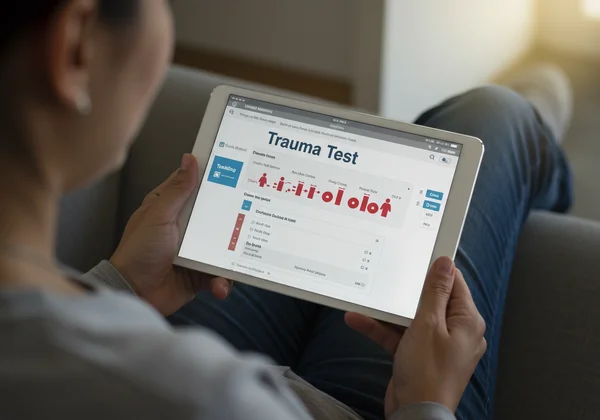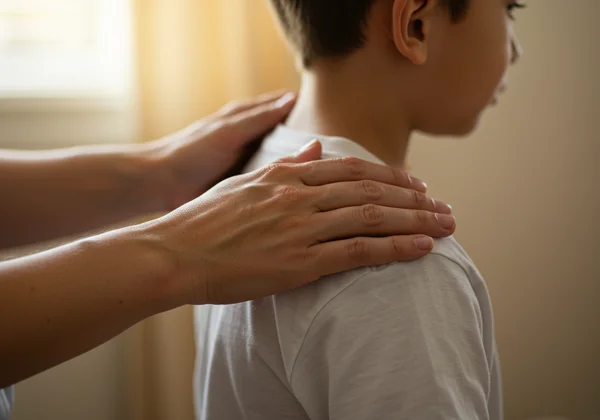Free Trauma Test & Online Quiz: A First Step to Understanding Your Past
August 17, 2025 | By Nora Hayes
Life can leave marks on us in ways we don't always understand. You might feel a persistent sense of unease, find yourself overreacting to small things, or struggle with relationships without knowing why. These feelings are valid, and you're not alone in searching for answers. Many people find themselves asking a difficult but important question: How do I know if I have trauma? Taking a confidential trauma test can be a gentle, insightful first step toward clarity and self-understanding. It’s not about labels, but about illuminating the path toward feeling more like yourself again. If you're ready to explore, you can take our free online trauma test today.
What is Psychological Trauma? More Than Just a Bad Memory
When we hear the word "trauma," our minds often jump to major, life-threatening events, often called "Big T" traumas. While these are certainly valid causes of psychological distress, the concept of trauma is much broader. It also includes "little t" traumas: experiences that are deeply distressing and overwhelm our ability to cope, even if they don't seem catastrophic to others. This could include ongoing emotional neglect, bullying, or the loss of a significant relationship.

Ultimately, trauma isn't about the event itself, but about the nervous system's response to it. It's the wound that remains after the event is over, shaping our thoughts, emotions, and even our physical well-being. Recognizing this is crucial because it validates that any painful experience, big or small, that left a lasting negative impact on your life deserves attention and care. Understanding your own unique trauma symptoms is a key part of the healing process.
Recognizing the Signs: What Unresolved Trauma Can Look Like
Unresolved trauma doesn't always look like the dramatic flashbacks we see in movies. More often, it shows up as a collection of confusing and persistent patterns that disrupt our daily lives. Your trauma response is your system's way of trying to protect you, but these adaptations can become challenges in themselves.
Here are some common signs that may point toward unresolved trauma:
- Emotional Turmoil: This can include sudden mood swings, chronic anxiety or depression, irritability, or feeling emotionally numb and disconnected from others.
- Intrusive Thoughts: Unwanted memories, nightmares, or feeling as though the past event is happening again. You might find yourself constantly replaying what happened.
- Avoidance: Actively avoiding people, places, or situations that remind you of the painful experience. This can also manifest as emotional avoidance, where you try to suppress thoughts and feelings.
- Hypervigilance: Feeling constantly on edge, easily startled, or always on the lookout for danger. This can lead to difficulty relaxing or sleeping.
- Strained Relationships: Trouble with trust, intimacy, and connection. You might push people away or find yourself in unhealthy relationship dynamics.
- Negative Self-Perception: Persistent feelings of shame, guilt, or worthlessness. You might blame yourself for what happened.
If any of these resonate with you, know that your experiences are real. Answering the question "am I traumatized quiz" through a structured assessment can provide a framework for understanding these patterns.
Taking the First Step with an Online Trauma Test
Thinking about past pain is hard, and the thought of talking to someone can be intimidating. This is where a confidential and free trauma test becomes an invaluable resource. It offers a private space for self-reflection without pressure or judgment. It’s a tool designed to help you connect the dots between your past experiences and your current struggles.

Our platform provides a scientifically-designed, 30-question screening to help you identify potential trauma symptoms. The process is simple, secure, and completely anonymous:
- Answer Honestly: Reflect on your feelings and behaviors based on the prompts.
- Receive Instant Results: Get a preliminary assessment of your potential trauma-related symptom level (low, medium, or high).
- Go Deeper with AI (Optional): For a more nuanced understanding, you can choose to answer a few more confidential questions to receive a personalized AI-driven analysis of your potential challenges and coping mechanisms.
This is not a diagnosis. It is a mirror, offering you a clearer picture of your emotional health and empowering you to begin the free trauma test toward healing.
A Guide for Parents: Understanding the Childhood Trauma Test
As a parent or guardian, it's heartbreaking to see a child struggle after a distressing event like a family disruption, bullying, or an accident. Children often don't have the words to express their pain, so their trauma manifests in their behavior. You might notice increased clinginess, unexplained anger, difficulty concentrating in school, or a regression to earlier behaviors. This is where a childhood trauma test can serve as a helpful guide.

Understanding Adverse Childhood Experiences (ACEs) and their potential long-term impact is critical. Our assessment is designed to be accessible for both adults reflecting on their past and for guardians concerned about a child. It provides a structured way to evaluate observed behaviors and emotions. Using this tool can give you the language and confidence to start a conversation with your child, a teacher, or a mental health professional. It’s a resource to help you better understand and support the child in your care. You can use our childhood trauma test and see if it feels right for your family.
Frequently Asked Questions
What are the 4 types of trauma?
While trauma can be categorized in many ways, a common framework includes: Acute Trauma from a single event (e.g., car accident), Chronic Trauma from repeated and prolonged exposure (e.g., domestic abuse), Complex Trauma (C-PTSD) from varied and multiple traumatic events, and Secondary Trauma, which is the emotional duress that results when an individual hears about the firsthand trauma experiences of another.
Can you self-diagnose trauma?
No, you cannot formally self-diagnose trauma. Tools like this one are powerful screening instruments designed to increase self-awareness and indicate if you might benefit from professional support. A formal diagnosis of PTSD or other trauma-related disorders can only be made by a qualified mental health professional, such as a psychologist or psychiatrist, after a comprehensive evaluation. Think of our free trauma screening as a thermometer—it tells you if there’s a fever, but a doctor tells you why.
What is the most accurate trauma test?
The "most accurate" test depends on the goal. For a clinical diagnosis, clinicians use structured interviews and validated assessments like the Clinician-Administered PTSD Scale (CAPS-5). For a preliminary, private self-assessment, a well-designed psychological trauma test like ours is highly effective. It is based on established psychological principles to provide a reliable first look at your symptoms, helping you decide on the next steps in your mental wellness journey.
How to heal from childhood trauma?
The healing journey is unique for everyone but often involves several key elements. It starts with acknowledgment—recognizing the impact of past events. Developing healthy coping mechanisms and grounding techniques is crucial for managing daily triggers. Ultimately, many find healing through trauma-informed therapy, where a professional can provide a safe space to process memories and build resilience. Our test is designed to be the very first, empowering step on that path.
Your Path to Understanding Begins Now
Your feelings are valid, and your experiences matter. Taking the time to understand the roots of your emotional pain is an act of profound self-care and courage. A trauma test is more than just a quiz; it’s a gateway to insight, a tool for validation, and the first light on a path toward healing and a richer life.
You don't have to navigate this journey alone. Let us provide a safe, confidential starting point. Ready to gain a deeper understanding of yourself? Start your free trauma test today.
Taking this first step is an act of self-care. If you feel this resource could help someone else, consider sharing it. Your privacy and safety are our highest priorities.